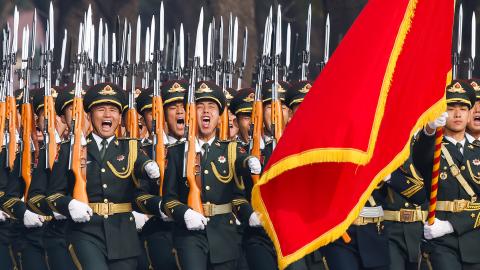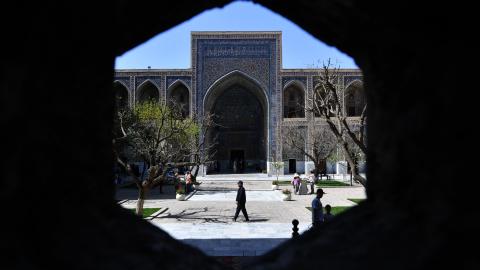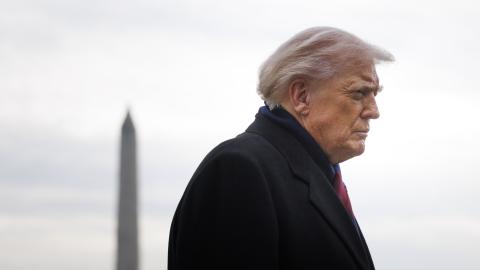“Janet, thanks for dropping by the Oval Office. It’s a dump but I’m packing to leave for China to see my new best friend Xi Jinping, so I couldn’t get away to my New Jersey country club. He really likes me. I tricked him into letting us sell some beef in China while he is distracted by building islands in some God-forsaken place where hotels will never make money. And building a new Silk Road. I know about construction, and you can’t build a road out of silk. But that’s his problem. I also know about the economy and like to give credit where credit is due. So I want to tell you that the recovery from the Great Recession and the great condition of the economy is due to my election. I coined a phrase for it—animal spirits. But everyone insists that your policy of zero interest rates and what economists call quantitative easing and I call printing money had something to do with it, so thanks for that. You know how to print money—but I like people who know how to make money. Like me. And Rex. And Wilbur. And Gary. And Steve. Or marry it, like Betsy. Or be born into it, like Elaine. I really like you. You’re fired.”
Donald Trump likes to claim “firsts.” This is the first time in over 60 years that a chair of the Federal Reserve Board has not been re-appointed after only one term. (We shall ignore a one-year stint as chairman by Bill Miller, how left for the Treasury.) Other than that McCabe who served from 1948 to 1951 was the last chairman to serve fewer than 8 years.
It is also the first time in at least 40 years that the chairmanship has not gone to an economist. Jerome “Jay” Powell, President Trump’s nominee, may not be an economist, but he steeped himself in the literature of monetary policy via a crash course at a Washington think tank. And he brings something to the job that Yellen did not—experience on Wall Street, including a stint at the Carlyle Group, where he made enough millions to make him the richest Fed chairman since Marriner Eccles, who served from 1934 to 1948, after making his fortune in banking.
And besides, imbibing monetary theory with one’s mother’s milk is not an important qualification. The chairman’s job is to read incoming data, put hard questions to the Fed staff members who study the entrails of their models (and whose forecasting record is far from stellar), and persuade his colleagues to go along with his decisions. Which should be no problem for Powell, who is known as a consensus-builder. Self-effacing, say friends. “Mr. Ordinary,” says a Wall Street Journal headline.
Trump opted for continuity, not change, a compliment of sorts to Yellen’s stewardship. Powell, a Republican, was appointed to the Fed board by President Obama in 2012, and had supported Yellen’s monetary policy decisions since her appointment two years later.
Which is why vice president Mike Pence and the more radical members of the Trump team opposed Powell’s appointment. They preferred John Taylor, a Stanford economist who favours a more formulaic approach to monetary policy, and would have pushed interest rates up faster than Powell likely will. Trump knows that the ultimate success of his presidency depends on delivering a rapidly growing economy, and creating such a drag on growth seems like a very bad idea indeed. But beware: there are still vacancies to be filled. To appease Pence and his core, Trump just might name Taylor or a Taylor-think-alike to the Board and designate him vice chairman.
So, you might ask, if Powell’s views on policy matters are so close to Yellen’s, why not leave her in the chair? For two reasons. First, Trump as says, “You like to make your own mark,” more a statement of the requirement of his ego than of the nation’s policy needs. Second, Washington wags say that Powell gives the president something he seeks in appointees—in addition to significant wealth: a candidate who looks as if he were sent from central casting. Which Powell surely does.
It is now likely that interest rates will continue their moderate upward path, and the shrinkage of the Fed balance sheet will proceed at the modest, but accelerating, rate laid out by Yellen. Powell does differ from Yellen in one regard: He is a bit more willing to consider rolling back some financial regulations. But he is not the wild-eyed deregulator that some Republicans would have preferred.
Powell inherits a reasonably healthy economy:
- The economy added 261,000 jobs last month, bringing the 6.7 percent unemployment rate Yellen inherited to 4.1 percent.
- The economy has put together two quarters of at least 3 percent growth for the first time since 2014.
- Consumer confidence is at its highest level in 17 years.
- The manufacturing sector continued to expand in October, although at a slightly slower pace than the 13-year peak reached in September.
- Share prices continue to rise to record levels almost daily.
At minimum, Yellen can reasonably claim credit for not having aborted the recovery by raising rates prematurely, as the Fed did during the Great Depression of the 1930s.
But even she could not hand Powell a trouble-free economy. Wages seem stuck—despite reports of labour shortages, average hourly earnings are flat, according to Friday’s jobs report. Auto sales increasingly depend on super-generous credit terms and deep discounts.
And there are always those events, dear boy, events, that so worried Harold Macmillan.
When the new chairman rummages in the Fed tool kit he might find that all the tools have been worn down by over-use since the Great Recession—interest rates too low to cut, the balance sheet too swollen to expand. We will then find out whether experience in the real world of finance tops advanced training in economic theory as a crisis-fighting guide.



















